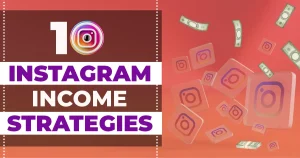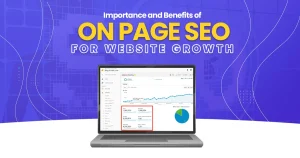Social Media Marketing is a powerful way for all sizes of businesses to reach customers. Creating quality content can attract a broader audience through various types of social media platforms. So, if you are not on platforms like LinkedIn, Facebook, and Instagram, you’re missing out.
A Quick Overview of Social Media Marketing
SMM is a form of digital marketing that leverages the importance of social media marketing networks to gain branding and marketing goals. However, it is not only about creating business profiles and posting whenever you feel like it. It requires an effective strategy with measurable objectives and also includes:
- Optimizing and maintaining profiles.
- Posting stories, pictures, videos, and live videos representing the brand
- Responding to likes, shares, comments, and monitoring reputation.
- Engaging and following with influencers, followers, and customers to build a community around your brand.
Additionally, there are some best social media marketing platforms, including LinkedIn, Facebook, Twitter, Instagram, Snapchat, and TikTok. Also, social media marketing includes paid social media advertising. Here, you can pay to have your business appear in front of wider volumes of highly targeted users.
5 Pillars Of Social Media Marketing:
These five pillars of SMM will surely lead to a successful program, including:
- Strategy: An efficient strategy is necessary for any marketing activity or campaign. Some examples include determining your goals, selecting social media platforms, and mixing and delivering your content for different platforms.
- Planning and Publishing: The next is publishing, and it can be as simple as posting a blog, sharing some information about something, or posting a product video. But, it’s essential to be consistent for an efficient SMM program.
- Listening and Engagement: Creating activities on social platforms can increase conversations and interactions about the products and brand. Customers will communicate through commenting and will ask about the products and services.
- Analytics and Reporting: After publishing, the audience will surely increase. Therefore, it is a good idea to measure your analytics and overall reports.
- Advertising: Advertising platforms are so effective nowadays that you can specify who to show your ads to. You can generate target audiences based on their behaviors, demographics, interests, and more.
Benefits Of Social Media Marketing
With such across-the-board versatility and usage, social media is one of the most useful free channels for marketing. Here are some of the typical benefits of social media marketing. Including:
- Reaches a broader audience: There are more than 3.8 billion users across all the social media platforms.
- Cost-effective tool: The cost of executing a social media program is quite low if you execute it correctly. Therefore, social media marketing is cost-effective.
- Higher website traffic: Social media posts are effective in increasing website traffic.
- Increased customer satisfaction: Businesses don’t just market to audiences but also interact with them. It increases customer satisfaction and also creates one-to-one relationships.
- Gain better insights: Using reporting and analytical features helps to gain all the insights in an efficient way.
Social Media Marketing Strategy and Plan For Your Business:
A thriving social media marketing strategy will be unique for every business, but here are some points that will be common, including:
- Know about your audience: It is important to know about your audience, what platforms they use, who they are following, what content they like to see, etc.
- Brand Identity: The message you want to convey to your audience and how you want to make them feel after viewing your content matters to make identity.
- Content Strategy: A planned content strategy is essential to be able to produce quality content on a daily basis and to have a consistent voice.
- Analytics: Gaining insights will let you know about the strategy. It will help you to know about many things, including the best to post, the right content to share, and many more.
- Regular activity: If you want to grow your business, you have to post on a regular basis, keep up to date with trends, maintain accurate profiles, and much more.
- Inbound approach: Keep your focus on adding value through interesting and useful content. This will also organically promote the business, and others will promote it for you.
How To Create A Social Media Marketing Plan?
The social media marketing plan is key to carrying out your strategy. It puts structure around the efforts so you can measure the success and ensure that you are spending your resources effectively. Here’s how you can create your social media plan in an effective way:
- Choose Platforms based on your target audience, popular for your industry, and your bandwidth.
- Set objectives and goals like posting content daily for a month, and getting your profiles set up, and you can also do competitive analysis.
- Adjust and report regularly: Make use of every platform’s analytics to identify which content is generating the most engagement.
How To Do Social Media Marketing For Small Businesses?
Social media marketing for small businesses is about being tactical and strategic. These businesses need to be more creative, agile, and nimble. If you are thinking that you will throw money at an issue and hope something good will happen. It is important to be more smart and know how to use social media to reach the target audience.
If you want to compete, it is important to get online. Here are five vital reasons for using social media for small business, including:
- Reaching more potential customers
- Increasing brand awareness
- Understanding customers better
- Understanding competitors more deeply
- Building a long-term relationship with customers
Now, that you know how to use social media for all the small businesses out there, it is time to get online now. It is important to make our online presence on every platform possible. Don’t just guess about where your audience spends their online time.
Selecting platforms does not have to be an all-or-nothing approach. You can surely use various social platforms to reach several audiences or meet different business goals. Some of the best social media platforms for small businesses are Facebook, Instagram, Twitter, TikTok, Pinterest, and YouTube.
Social Media Management Tools For Small Businesses:
There are multiple social media management tools for small businesses. These tools can facilitate your workflows, save time, and ensure your content is reaching the correct audience at the correct time.
The list mentioned below are the top-rated tools overall, and each tool has unique features and advantages.
- Zoho Social: It offers features like social media monitoring, scheduling, analytics, and collaboration for effective social media management.
- HubSpot: HubSpot combines all the marketing efforts into a single platform, and you can seamlessly compare the results across the marketing channels.
- Hootsuite: This is an all-in-one platform allowing you to curate and schedule content, sun social media ads, measure social metrics, and more.
- Sendible: This tool is specially built for agencies with multiple clients. It also permits users to create dashboards which are customizable.
- Loomly: Loomly is another tool for managing your social media for small businesses. This tool is best for TikTok and Snapchat.
- Sprout Social: It is one of the few social media management tools for small businesses providing CRM features.
- Buffer: Buffer is another useful tool to help drive meaningful growth and engagement on social media.
- eClincher: It allows you to publish and schedule posts, analyze your performance, and respond to messages through its social inbox.
- Social Pilot: This tool is great because it suggests and curates content from various industries to help you find relevant content seamlessly.
- CoSchedule: This is great for content marketers who want to schedule all their projects effectively and stimulate team collaboration in one place.
Final Line:
SMM or Social Media Marketing uses different social media platforms to engage with customers to drive website traffic, build brands, and increase sales. Some effective and best social media platforms include Facebook, Instagram, Twitter, and more. Additionally, for small businesses, effective strategies and tools will make your online presence more effective.
Frequently Asked Questions (FAQs)
The 7 C’s are conversion, customer, context, content, convenience, community, and cohesion.
A social media marketer maintains and creates marketing campaigns, brand promotions, and company information for the company across multiple social media networks.
Excellent Communication, Creativity, Writing Ability, Content Curation, Project Management, Aptitude to Learn, and many more.







